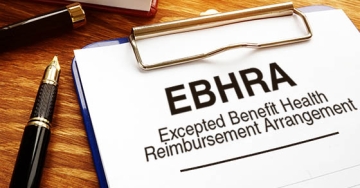Recent News & Blog / Supplementing your company’s health care plan with an EBHRA

October 28, 2022
Is your business ready to take its health care benefits to the next level? One way to do so is to supplement group health coverage with an Excepted Benefit Health Reimbursement Arrangement (EBHRA). Here are some pertinent details.
Rules to follow
Under a traditional HRA, the employer owns and funds the tax-advantaged account up to any chosen amount. However, traditional HRAs are subject to mandates under the Public Health Service Act (PHSA), which was amended by the Affordable Care Act (ACA).
Because employer contributions to EBHRAs are limited, these accounts qualify as “excepted benefits” and aren’t subject to the PHSA mandates. EBHRAs can be offered by companies or other employers of any size, but they must follow certain rules, such as:
Limited-dollar benefits. In 2022, up to $1,800 can be newly allocated to each participant per plan year to reimburse eligible medical expenses. This amount will rise to $1,950 for plan years beginning in 2023 — the first time the limit has increased since these arrangements were launched in 2020.
Carryovers, which are permitted under both traditional HRAs and EBHRAs, are disregarded when applying the limit. Amounts made available under other HRAs or account-based plans provided by the employer for the same period will count against the dollar limit unless those arrangements reimburse only excepted benefits.
Qualified reimbursements. An EBHRA may reimburse any qualifying, out-of-pocket medical expense other than premiums for individual health coverage, Medicare or non-COBRA group coverage. Premiums for coverage consisting solely of excepted benefits can be reimbursed, as can premiums for short-term limited-duration insurance (STLDI). However, under certain circumstances, federal agencies may prohibit small employer EBHRAs in particular states from allowing STLDI premium reimbursement.
Required other coverage. The employer must make other nonexcepted, non–account-based group health plan coverage available to EBHRA participants for the plan year. Thus, participants in the EBHRA couldn’t also be offered a traditional HRA.
Uniform availability. An EBHRA must be made available under the same terms and conditions to all similarly situated individuals, as provided by applicable regulations.
HIPAA and ERISA
An EBHRA’s status as an excepted benefit means only that it’s not subject to the ACA’s PHSA mandates or the portability and nondiscrimination rules of the Health Insurance Portability and Accountability Act (HIPAA).
However, EBHRAs are subject to HIPAA’s administrative simplification requirements. This includes the law’s privacy and security rules unless an exception applies — such as for certain small self-insured, self-administered plans.
And, like traditional HRAs, EBHRAs are subject to the Employee Retirement Income Security Act (ERISA) unless an exception applies — such as for church or governmental plans. Thus, reimbursement requests must be handled in accordance with ERISA’s claim and appeal procedures; EBHRA participants must receive a summary plan description; and other ERISA requirements apply.
Finally, EBHRAs must comply with nondiscrimination rules. These generally prohibit discrimination in favor of highly compensated individuals regarding eligibility and which benefits are offered.
Various factors
When deciding whether to offer an EBHRA at your business, you’ll need to consider various factors. These include the impact on existing benefits, which employees will be covered, how much you’ll contribute and which expenses you’ll reimburse. We can help you assess the costs, advantages and risks of this or any other employee benefit you’re considering.
© 2022